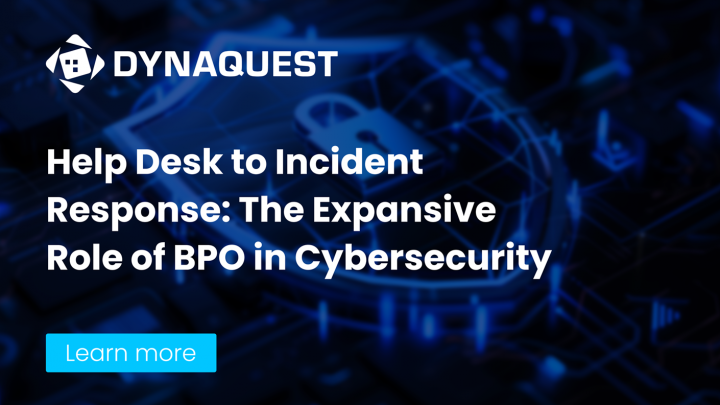BPO in Cybersecurity—A New Frontier in Digital Defense
The Cybersecurity Battlefield: How BPOs Are Rising to the Challenge In today’s hyperconnected world, businesses face an overwhelming and constantly evolving array of cyber threats. From ransomware to phishing attacks, organizations must remain vigilant to protect their digital assets. Alarmingly, a staggering 94% of organizations have reported email security incidents, a clear sign that businesses are struggling to manage the surge in cyberattacks (Egress, 2024). With cybercrime growing more sophisticated, many companies have realized their in-house IT departments lack the bandwidth or expertise to handle the magnitude of these threats. Enter Business Process Outsourcing (BPO). Traditionally known for managing back-office operations and customer support, BPOs have now evolved into key players in cybersecurity. These providers are stepping in to fill critical gaps, offering 24/7 security monitoring, threat detection, and even incident response. This blog will explore how BPOs are transforming from simple help desks into the front line of defense for businesses, protecting them from the ever-growing cybersecurity threats. From Help Desk to Cyber Defenders: How BPOs Are Reinventing Themselves The concept of outsourcing isn’t new—businesses have been outsourcing IT services for years. However, what’s new is the shift in the type of services BPOs offer. Once responsible for handling basic IT help desk queries or troubleshooting technical issues, BPOs are now reinventing themselves as key cybersecurity defenders. As businesses realize the critical importance of real-time cyber threat detection, many have turned to BPOs to handle both help desk support and cybersecurity tasks. This transition hasn’t happened overnight. As cyber threats have evolved, so too has the technology and expertise within the BPO industry. Today’s BPOs are staffed with highly skilled cybersecurity professionals who manage Security Operations Centers (SOCs), utilize threat intelligence platforms, and respond to security incidents as they happen. Companies that initially outsourced simple tasks like customer service are now seeing their BPOs handle advanced cybersecurity functions, such as: The Perfect Storm: Why Businesses Are Turning to BPOs for Cybersecurity There are several key reasons why businesses are increasingly turning to BPOs for their cybersecurity needs. First and foremost, the complexity of cyber threats has exploded in recent years. Cybercriminals are no longer isolated individuals; they operate as sophisticated organizations with access to tools like malware-as-a-service or ransomware kits. This means businesses need constant monitoring and a rapid response capability, which can be difficult to maintain internally. Second, there’s a growing shortage of cybersecurity talent. According to industry reports, there’s a global shortfall of approximately 3.4 million cybersecurity professionals. Companies are struggling to find and retain skilled experts, making BPOs—who can provide immediate access to specialized teams—a natural solution. Third, the cost of maintaining an in-house cybersecurity team is often prohibitively expensive. For many businesses, outsourcing these services to a BPO provides a cost-effective alternative, enabling them to access cutting-edge cybersecurity resources without the heavy investment in infrastructure and personnel. BPOs offer a scalable model, allowing businesses to adjust their cybersecurity coverage as their needs grow or fluctuate. The Rise of Outsourced Security Operations Centers (SOCs) A key component of BPO cybersecurity services is the Security Operations Center (SOC). These are dedicated teams responsible for monitoring, detecting, and responding to security incidents around the clock. Many BPOs now operate global SOCs, using a combination of human analysts and advanced tools to offer continuous protection for their clients. SOC services typically include: For example, one multinational company partnered with a BPO to oversee its SOC operations. Within six months, the BPO team detected and neutralized a significant ransomware attack before it could encrypt sensitive company data. This proactive defense illustrates the value of outsourcing cybersecurity functions to BPOs that have the tools and expertise to manage threats efficiently. As we’ve seen, the role of BPOs in cybersecurity is expanding rapidly. From managing help desks to responding to complex cyber incidents, BPOs are now at the forefront of protecting businesses from evolving threats. Their ability to provide scalable, cost-effective solutions is making them indispensable in a world where cyberattacks grow more frequent and sophisticated by the day. However, this is just the beginning. In Part 2, we’ll dive deeper into the advanced technologies and strategies BPOs are leveraging to stay ahead of cybercriminals. We’ll explore how BPOs are leading the charge in incident response, harnessing AI, and filling the global cybersecurity talent gap to offer businesses robust digital defense systems.








